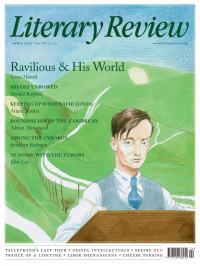Clare Clark
Murder Most Foul
The Evening Road
By Laird Hunt
Chatto & Windus 278pp £14.99
In a high-profile speech at last year’s Brisbane Writers Festival, Lionel Shriver tackled with her usual candour the question of cultural appropriation in fiction. Her assertion that cultural appropriation is the fundamental business of fiction, that any story worth its salt is by necessity peopled with characters who are not the writer and who do not share the writer’s experiences, provoked much comment. Less widely discussed was her admission that what she called ‘this climate of scrutiny’ has affected her own writing, so that, over the last ten years, she has become much more chary of depicting characters of different races in her novels. ‘Availing yourself of a diverse cast, you are not free; you have inadvertently invited a host of regulations upon your head, as if just having joined the EU,’ she claimed. ‘Use different races, ethnicities, and minority gender identities, and you are being watched.’
One cannot help wondering whether Laird Hunt would agree. A white middle-aged American man, he has sought in his last three novels to explore the USA’s troubled past from the viewpoint of those to whom conventional histories have denied a voice. It hardly needs saying that his protagonists

Sign Up to our newsletter
Receive free articles, highlights from the archive, news, details of prizes, and much more.@Lit_Review
Follow Literary Review on Twitter
Twitter Feed
Margaret Atwood has become a cultural weathervane, blamed for predicting dystopia and celebrated for resisting it. Yet her ‘memoir of sorts’ reveals a more complicated, playful figure.
@sophieolive introduces us to a young Peggy.
Sophie Oliver - Ms Fixit’s Characteristics
Sophie Oliver: Ms Fixit’s Characteristics - Book of Lives: A Memoir of Sorts by Margaret Atwood
literaryreview.co.uk
For a writer so ubiquitous, George Orwell remains curiously elusive. His voice is lost, his image scarce; all that survives is the prose, and the interpretations built upon it.
@Dorianlynskey wonders what is to be done.
Dorian Lynskey - Doublethink & Doubt
Dorian Lynskey: Doublethink & Doubt - Orwell: 2+2=5 by Raoul Peck (dir); George Orwell: Life and Legacy by Robert Colls
literaryreview.co.uk
The court of Henry VIII is easy to envision thanks to Hans Holbein the Younger’s portraits: the bearded king, Anne of Cleves in red and gold, Thomas Cromwell demure in black.
Peter Marshall paints a picture of the artist himself.
Peter Marshall - Varnish & Virtue
Peter Marshall: Varnish & Virtue - Holbein: Renaissance Master by Elizabeth Goldring
literaryreview.co.uk